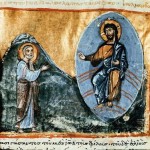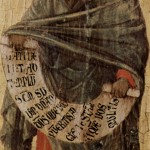
Habakkuk 1:1-4, 2:1-4 and/or Isaiah 1:10-18
What It’s About: These passages are both from the inaugural portions of the the books, where the prophets Habakkuk and Isaiah are setting the tone and agenda for their oracles. In both cases there is a strong emphasis on the plight of the weak and the disadvantaged, and on the wickedness of the powerful for taking advantage of them. And in Isaiah in particular there is a strong emphasis on the right expression of piety; Isaiah is denigrating the kind of piety that is expressed in religious observance, and instead privileging the kind of piety that is expressed in social ethics and social justice. Isaiah is crying out that all the festivals, offerings, prayers, and appearances at the temple cannot paper over injustice, and both Isaiah and Habakkuk are laying injustice at the feet of the society as a whole.
What It’s Really About: This focus on justice and social ethics, even at the expense of traditional religious practice, is typical of the prophets. The prophetic literature works as a critique of society, but also as a critique of the normal ways of expressing devotion to God. Both Habakkuk and Isaiah are well within the prophetic tradition in the kind of hostility to religiosity that Isaiah shows, or the criticism of violence and oppression that Habakkuk talks about. Israelite prophecy was never really about telling the future, in the way we think about prophets today (Nostradamus predicted nuclear disaster in 2016!). Israelite prophecy was about analyzing the present, and warning about consequences for the behavior that is happening in the present. Looming calamity is not some sensationalistic claim; it is the natural consequence of the iniquity of society and religion.
What It’s Not About: The parts of Habakkuk 1 that are omitted deal with the Chaldeans (the Babylonians) and a divine charge/grant to them to demolish Israel. This is very typical of the prophets; the prophets often claim that God uses foreign powers to mete out justice. But the lectionary tends to skip these kinds of passages, maybe because they it makes us uncomfortable to see God’s purposes in violence and destruction. I agree with this decision, largely, but it does play with our notions of where God stands in conflict. Is God on the side of the victims of violence? Or is God arming the aggressors? Does God stand with those who suffer in war? Or is God a general for the bad guys, in order to teach us all a lesson? It’s an uncomfortable set of questions.
Maybe You Should Think About: With the US election only 9 days away by the time these scriptures are preached, it’s not a bad time to reflect on the intersections of politics and religion. Americans are rightly shy about mixing church and state, and the church, I would argue, has as much or more to lose from the mixture than the state does. But the church does have a role in critiquing the state and the society, and I think it’s absolutely legitimate for Christians and other religious people to vote out of their religious convictions. Without telling congregants how to vote, these passages might provide a good footing from which to talk about the ways our religion can critique our political life together. If Isaiah and Habakkuk were alive today, would they be crying out against the injustice of our society? Probably.
What It’s About: This is another beginning–the beginning of the second letter to the Thessalonians. This one comes about seven centuries later, probably having been written in the late first century. Scholars are divided over 2 Thessalonians; some think Paul wrote it, and others think he didn’t. But the letter itself claims to be written by Paul, along with two co-workers, Timothy and Silvanus. The portion we have here is the greeting and the thanksgiving; Paul’s letters followed a predictable pattern, and even if this one wasn’t written by Paul, it follows that pattern in order to lend legitimacy to the letter.
What It’s Really About: I never know what to do with passages like this. This is pretty…blah. Not that 2 Thessalonians is blah, but this particular section is nothing special, in my opinion. This is the formality of a letter; this is the “to whom it may concern” of ancient letter-writing, and there isn’t much here in terms of content. These kinds of texts can be difficult to preach on, without getting very creative.
What It’s Not About: Verses 5-10 are interesting! Like the Isaiah and Habakkuk texts above, the part that is skipped is as interesting as the parts that are included, or maybe more so. Again, the impetus for the omission seems to be that the material is just uncomfortable, and that it doesn’t quite fit with our ideas of what biblical texts ought to be. Here the lectionary is omitting vengeance, punishment, destruction, and the like…the kind of stuff that is awkward on a Sunday morning.
Maybe You Should Think About: It’s always worth thinking about how the lectionary acts as a canon-within-a-canon, and how it selects and narrows what we hear and think of as “scripture” in a functional, Sunday-morning kind of way. By skipping over the scary, violent, judgey parts, the lectionary changes the text, and it dissociates words that the biblical text actually puts together. That might be for the best, and it certainly makes Sunday mornings more pleasant, but it’s not a neutral practice, and we would do well to be very aware of it.
What It’s About: If you’re like me, you can’t hear this story without that children’s song going through your head: “Zacchaeus was a wee little man.” This is the tale of Zacchaeus, a tax collector who was apparently short, who had an encounter with Jesus as he passed through town. As a tax collector (THE tax collector in town, actually), Zacchaeus was a “sinner,” and also probably one of the most loathed people around. Jesus being Jesus, Zacchaeus was just the right kind of person to hang out with, which made everyone else very angry and confused. That was kind of Jesus’ thing–hanging out with the wrong sort, and thereby sending the message that if you find yourself thinking about who the wrong sort is, you’re doing it wrong.
What It’s Really About: Roman tax collection worked kind of like modern debt collection. Rome wanted X amount of money from each province and municipality, and contractors bid on the right to collect that money. Then, they went about extracting as much as they could from the people. If Rome required 10 denarii, and the collectors extracted 13, then their profit was 3. So there was absolutely every incentive to squeeze the people as hard as they could, which led to the first-century equivalent of debt collection phone calls–burly guys showing up on your doorstep making threats and carrying through on them. So Zacchaeus would have been seen as immoral, but also more than that, as a predatory collaborator with Roman rule. He was doubly awful. He would have been an unthinkable sort of person for any self-respecting Jewish messiah to want to engage.
What It’s Not About: I think the height thing has probably been overdone here. When I was a kid and singing that “wee little man” song, the passing reference to Zacchaeus’ height was a kind of hook for children to think about the story: “hey, you kids are short too!” But I don’t see his stature as the key disadvantage for Zacchaeus here; it’s just a literary device to move the story along. His key disadvantage was that he was the worst kind of person, a loan shark rolled up with a money launderer combined with a protection racket and covered in Roman collaboration. He was as villainous as villains could be.
Maybe You Should Think About: It’s stunning how economic salvation is in this story. Look at verses 8-10, where Zacchaeus’ admission of guilt and his promise to repay in extravagant terms (fourfold!) leads directly to Jesus’ pronouncement: “today salvation has come to this house.” Economic restoration is effective for the man’s salvation. Undoubtedly many will object, and say that the economic restitution is a symbol of some deeper, more spiritual conversion, but that isn’t what the text say, at all. The text tells a story of a man who, face to face with Jesus, spontaneously agrees to stop exploiting the poor and pay them back, and who receives salvation because of it.










